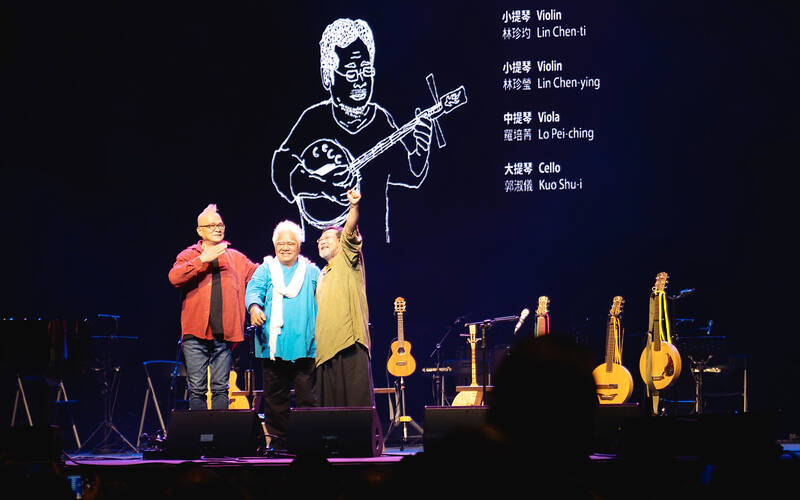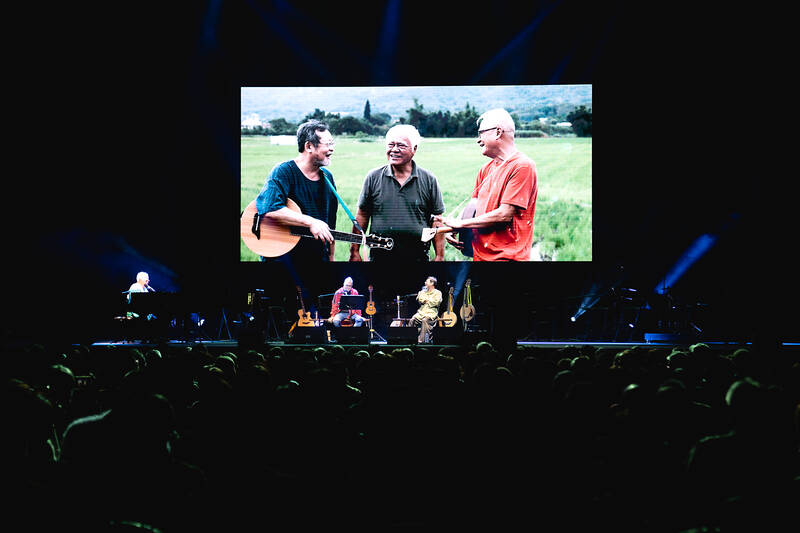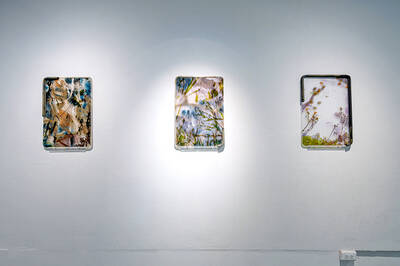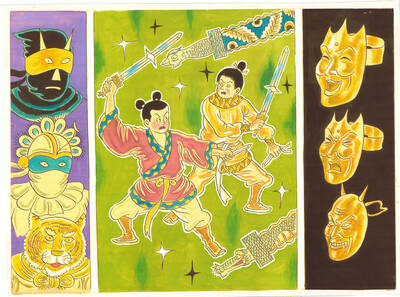It was a legendary moment for Taiwan’s musical history as Chen Ming-chang (陳明章), Ara Kimbo and Chen Yung-tao (陳永淘) took the stage together, nearly three hours into last Friday’s “Three Greats of Taiwanese Folk Music” concert.
Now in their 60s and 70s, the “wandering bards” (吟遊詩人) not only made their first joint performance, they also co-composed a brand new song for the occasion, sung in their respective mother tongues of Hoklo (commonly known as Taiwanese), Puyuma and Hakka.
As a music, history and language enthusiast, this show hit all the right notes for me. The seasoned artists had each delivered an entertaining and emotionally powerful set interspersed with intimate footage of them discussing their life and work, but it was still hard to imagine what would come next.

Photo courtesy of Peng Ting-ling
Despite falling under the nativist folk genre and drawing passionately from the land and traditional culture, the three embody quite distinct musical styles and characters, and their banter is heartfelt yet hilarious.
Always smiling and downing kaoliang liquor throughout the show, Chen Ming-chang is free-spirited and unrestrained, singing energetically about drinking, love and the daily lives of ordinary folk. Ara Kimbo’s husky, resonant voice is intense and hits like a brick. It’s controlled yet wild at the same time, often breaking into traditional indigenous melodies. As a long-time activist, many of his songs touch upon the environment and the rights of his people. Sporting a graying mohawk, Chen Yung-tao’s timbre is cleaner but deep and far-reaching. He brings an innocence, playfulness and longing for a simpler past and nature into his songs. He’s also drawn to indigenous culture and plays a mouth harp on some songs.
Their first number was a new rendition of Thinking Back (思想起), a classic Hengchun (恆春) folk tune most famously recorded in the 1970s by Taiwan’s prototypical wandering bard Chen Ta (陳達), who died in 1981.

Photo courtesy of Peng Ting-ling
Chen Ming-chang opens the song strumming on his “ming” lute (明琴), a self-invented three-stringed version of the moon lute, while Ara Kimbo freely harmonizes in his iconic voice, while his fingers dance across the grand piano. Chen Yung-tao joins in later with his acoustic guitar, crooning in Hakka about his childhood in his hometown of Guansi (關西) in Hsinchu County.
“It’s different from what we rehearsed,” one of them quips afterward. “Every time we play it, it’s different,” another laughs. They make similar comments after the next song, Paktow (A Grain of Rice, 一粒米), written last August when the three met up for the first time at Chen Ming-chang’s home in Taipei’s Beitou District (北投).
Ara Kimbo wrote the first part about Chen Ming-chang, commenting on how the mountains in the north resemble the ones in his native Taitung County, and how Chen behaves even more indigenous than he is, especially after he drinks. They each present their impressions of Beitou, and their distinct voices and languages meld together. Not only is the resulting sound moving, I also think of how these languages were once suppressed by the government, and how we have the fortune today to hear them in unison on one of Taiwan’s biggest stages.
Chen Yung-tao’s A Tung’s Song (阿東的歌) follows, with the playful chorus consisting of basic kinship terms in the Paiwan language. He wrote it about a half-Chinese, half-Paiwan friend who only knew two words in the language, and later they studied it together when the Council of Indigenous People released its first teaching material.
The show closes with another Hengchun folk song where they discuss its possible indigenous origins, and Bulai Naniyam Kalalumayan, a Puyuma tune praying for the young men conscripted to fight in the 1958 Second Taiwan Strait Crisis to come home safely. Chen Ming-chang and Chen Yung-tao add in their pleas, as all ethnic groups in Taiwan were affected by this skirmish.
It was already a great show with just their individual performances, but I was really hoping that they would create something new, and not just sing each other’s songs as they were written. And they did not disappoint. Before heading off stage, Chen Yung-tao says, “Let’s do this again next year, shall we?”
I sure hope they do.

In late October of 1873 the government of Japan decided against sending a military expedition to Korea to force that nation to open trade relations. Across the government supporters of the expedition resigned immediately. The spectacle of revolt by disaffected samurai began to loom over Japanese politics. In January of 1874 disaffected samurai attacked a senior minister in Tokyo. A month later, a group of pro-Korea expedition and anti-foreign elements from Saga prefecture in Kyushu revolted, driven in part by high food prices stemming from poor harvests. Their leader, according to Edward Drea’s classic Japan’s Imperial Army, was a samurai

Located down a sideroad in old Wanhua District (萬華區), Waley Art (水谷藝術) has an established reputation for curating some of the more provocative indie art exhibitions in Taipei. And this month is no exception. Beyond the innocuous facade of a shophouse, the full three stories of the gallery space (including the basement) have been taken over by photographs, installation videos and abstract images courtesy of two creatives who hail from the opposite ends of the earth, Taiwan’s Hsu Yi-ting (許懿婷) and Germany’s Benjamin Janzen. “In 2019, I had an art residency in Europe,” Hsu says. “I met Benjamin in the lobby

April 22 to April 28 The true identity of the mastermind behind the Demon Gang (魔鬼黨) was undoubtedly on the minds of countless schoolchildren in late 1958. In the days leading up to the big reveal, more than 10,000 guesses were sent to Ta Hwa Publishing Co (大華文化社) for a chance to win prizes. The smash success of the comic series Great Battle Against the Demon Gang (大戰魔鬼黨) came as a surprise to author Yeh Hung-chia (葉宏甲), who had long given up on his dream after being jailed for 10 months in 1947 over political cartoons. Protagonist

Peter Brighton was amazed when he found the giant jackfruit. He had been watching it grow on his farm in far north Queensland, and when it came time to pick it from the tree, it was so heavy it needed two people to do the job. “I was surprised when we cut it off and felt how heavy it was,” he says. “I grabbed it and my wife cut it — couldn’t do it by myself, it took two of us.” Weighing in at 45 kilograms, it is the heaviest jackfruit that Brighton has ever grown on his tropical fruit farm, located